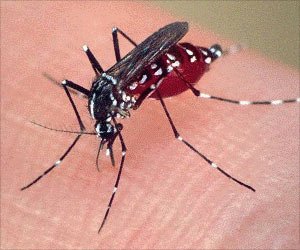New Monoclonal Antibody May Prevent Malaria: NIH Trial

“Malaria continues to be a major cause of illness and death in many regions of the world, especially in infants and young children; therefore, new tools are needed to prevent this deadly disease,” said NIAID Director Anthony S. Fauci, M.D.
“The results reported suggest that a single infusion of a monoclonal antibody can protect people from malaria for at least 9 months. Additional research is needed, however, to confirm and extend this finding.”
Advertisement
According to the World Health Organization, wround 229 million cases of malaria occurred worldwide in 2019 causing 409,000 deaths in sub-Saharan Africa. Till now, no licensed or experimental malaria vaccine that has completed Phase 3 testing provides more than 50% protection from the disease over the course of a year or longer.
Antibodies can prevent malaria by neutralizing the sporozoites of P. falciparum in the skin and blood before they can infect liver cells.
The NIAID trial tested whether a neutralizing monoclonal antibody CIS43LS could safely provide a high level of protection from malaria in adults after voluntary, laboratory-based exposure to infected mosquitos in the United States.
Researchers isolated CIS43 from the blood of a volunteer who had received an investigational malaria vaccine.
CIS43 binds to a unique site on a parasite surface protein that is important for facilitating malaria infection and is the same on all variants of P. falciparum sporozoites worldwide. The researchers subsequently modified this antibody to extend the amount of time it would remain in the bloodstream, creating CIS43LS.
VRC investigators then launched a Phase 1 clinical trial of the experimental antibody with 40 healthy adults ages 18 to 50 years who had never had malaria or been vaccinated for the disease.
The trial was led by Martin Gaudinski, M.D., medical director of the VRC Clinical Trials Program, and was conducted at the NIH Clinical Center in Bethesda, Maryland, and the Walter Reed Army Institute of Research (WRAIR) in Silver Spring, Maryland.
21 participants were given one dose of CIS43LS by either an intravenous infusion or an injection under the skin. The infusions ranged from 5 to 40 milligrams per kilogram (mg/kg) of body weight, and the subcutaneous injections were 5 mg/kg.
Participants were followed up for 6 months to see whether the infusions and subcutaneous injections of the various doses of the experimental antibody were safe and well tolerated. In addition, they measured the amount of CIS43LS in the blood to determine its durability over time.
Six participants who had received an intravenous infusion during the first half of the trial continued to participate. Four of these participants received a second antibody infusion while the other two did not.
Four new participants joined the study and received a single intravenous infusion of CIS43LS. Another seven people joined the study as controls who did not receive the antibody.
Volunteers are exposed to P. falciparum through bites of infected mosquitos in a carefully controlled setting, then are closely monitored by medical staff for several weeks and promptly treated if they develop malaria. CHMI has been used for decades to generate information about the safety and protective effect of malaria vaccine candidates and potential antimalarial drugs.
Nine participants who had received CIS43LS and six participants who served as controls voluntarily underwent CHMI and were closely monitored for 21 days. Within that period, none of the nine participants who had received CIS43LS developed malaria, but five of the six controls did. The participants with malaria received standard therapy to eliminate the infection.
Among the nine participants who received CIS43LS and were protected, seven underwent CHMI 4 weeks after their infusion. The other two participants had received their sole infusion during the first half of the study and were infected approximately 9 months later.
So, just one dose of the experimental antibody can prevent malaria for 1 to 9 months after infusion. These data provide the first evidence that administration of an anti-malaria monoclonal antibody is safe and can prevent malaria infection in humans.
Phase 2 clinical trial is underway in to evaluate the safety and efficacy of CIS43LS at preventing malaria infection in adults during a six-month malaria season. The trial is being led by Peter D. Crompton and Kassoum Kayentao. Results are expected in early 2022.
VRC scientists are also conducting further research on CIS43LS in the United States to determine the lowest dose that protects people from malaria infection.
“Monoclonal antibodies may represent a new approach for preventing malaria in travelers, military personnel and health care workers traveling to malaria-endemic regions,” said Dr. Seder.
“Further research will determine whether monoclonal antibodies can also be used for the seasonal control of malaria in Africa and ultimately for malaria-elimination campaigns.”
Source: Medindia
Source link
#Monoclonal #Antibody #Prevent #Malaria #NIH #Trial



